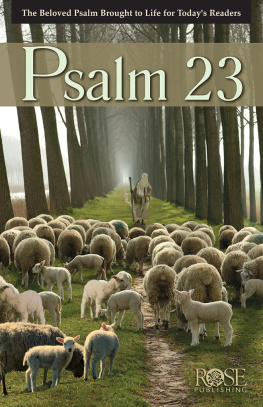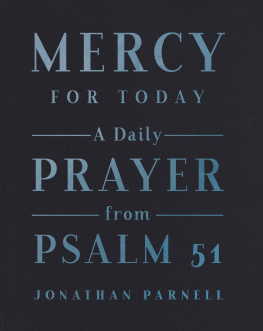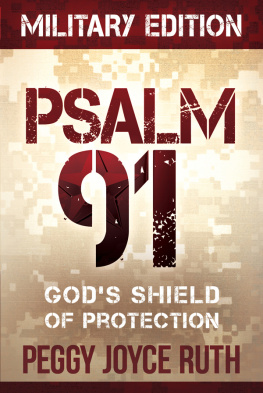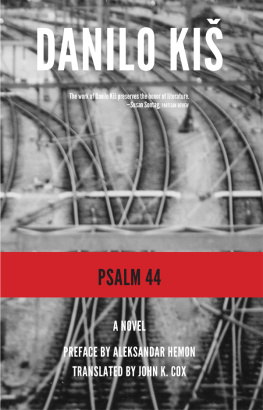
Cloister Books are inspired by the monastic custom of walking slowly and reading or meditating in the monastery cloister, a place of silence, centering, and calm. Within these pages you will find a similar space in which to pray and reflect on the presence of God.
My Soul in Silence Waits

My Soul in
Silence Waits
MEDITATIONS ON PSALM 62
Margaret Guenther

2000 Margaret Guenther. All rights reserved.
Published in the United States of America by Cowley Publications, a division of the Society of St. John the Evangelist. No portion of this book may be reproduced, stored in or introduced into a retrieval system, or transmitted, in any form or by any meansincluding photocopyingwithout the prior written permission of Cowley Publications, except in the case of brief quotations embedded in critical articles and reviews.
Library of Congress Cataloging-in-Publication Data: Guenther, Margaret, 1930
My soul in silence waits: reflections on Psalm 62 / Margaret Guenther.
p. cm.
Includes bibliographical references.
ISBN: 978-1-56101-181-0
1. Retreats. 2. Bible. O.T. Psalms LXIICriticism, interpretation, etc. I. Title.
BV5068.R4 G84 2000
Scripture quotations are taken from The New Revised Standard Version of the Bible, 1989, by the Division of Christian Education of the National Council of the Churches of Christ in the United States of America. Used by permission. Quotations from the Psalms are taken from the 1979 Book of Common Prayer.
Cynthia Shattuck, editor; Annie Kammerer, copyeditor; Vicki Black, designer. Cover photograph: Golden Daisy, Bugaboo Glacier Provincial Park by Dave Schiefelbein.
This book was printed on recycled acid-free paper by Versa Press in the United States of America.
Second printing
A COWLEY PUBLICATIONS BOOK
4501 Forbes Boulevard, Suite 200, Lanham, Maryland 20706
www.rowmanlittlefield.com
For Elizabeth, Katherine, and John

Contents

Acknowledgments
I wish to express my gratitude to Cowley Publications for a collegial working relationship that has been fruitful and stimulating. It has been a special pleasure to work with Vicki Black and Annie Kammerer. To Cynthia Shattuckfriend, critic, and fellow movie buffI can only say, Thank you!
We do not know who wrote the psalms, the songs and prayers of a whole people. Solely for convenience, I have referred to the author(s) as the psalmist.
As always, I am deeply grateful to my husband Jack for his support in the writing of this book.

introduction
Come Away
and Rest
The apostles gathered around Jesus, and told him all they had done and taught. He said to them, Come away to a deserted place all by yourselves and rest a while. For many were coming and going, and they had no leisure even to eat. (Mark 6:30-31)
This was no ordinary busy time for Jesus and his friends. He had sent out the twelve to teach and heal, and he himself was going among the villages teaching. Whats more, there had been a disastrous visit to his hometown. Who does this upstart think he is? was the reaction of the folk who had known him all his life, and they took offense at him (Mark 6:3). Most ominous for his ministry, though, was news of the fate of John the Baptizer, beheaded by Herod in prison. All in all, it was not a good time to turn his back on harsh reality and seek rest. Flight perhaps might be prudent, but not prayerful withdrawal for replenishment and re-creation.
In our hyperactive, high-achieving society, it is good to hold this picture of Jesus before us. He knew when it was time to retreat, seek a new spiritual landscape, and correct his perspective. This was not an isolated incident: again and again, Jesus removed himself from the scene of action. Periodically, he stopped preaching, teaching, healing, arguing with those authorities who wanted to trip him up. He left behind the people who wanted to share a meal with him, and those who just wanted a glimpse of him, or a chance to touch the hem of his garment. Most of us are tightly scheduled, burdened with obligations ranging from the sublime to the ridiculous, so that the very idea of walking away, simply withdrawing for a little while from the demands of the alleged real world, seems absurd if not impossibleeven if we do not live in fear of Herods executioner or the withering scorn of our neighbors. Jesus shows us a rhythm of going out and coming back, of departure and return almost like the regular, life-sustaining rhythm of respiration.
Mark gives us an especially vivid picture of Jesus seeming dereliction of duty:
That evening, at sundown, they brought to him all who were sick or possessed with demons. And the whole city was gathered around the door. And he cured many who were sick with various diseases, and cast out many demons In the morning, while it was still very dark, he got up and went out to a deserted place, and there he prayed. (Mark 1:32-35)
Peter and the disciples have to hunt him down to tell him that everyone is looking for him. Jesus responds, Let us go on to the neighboring towns (Mark 1:38). As one with a compulsion to get the job done, indeed, to be a model of efficiency leaving no loose ends and no stone unturned, I have been baffled by this story and even faintly disapproving. What right had Jesus to think of himself at a time like this? What right had he to walk away from all those people who needed him so much? But walk away he didnot out of indifference or hard-heartedness, but because he needed to renew and redirect himself.
If Jesus can do it, so can we. Were talking about retreat!

To go away by ourselves and rest is not an exercise in self-indulgent escapism, but rather a highly beneficial practice of spiritual self-care. But I havent time, we protest. Theres too much to do, too many projects to be completed, too many deadlines to be met. Maybe later, when things are under control.... The good newsor perhaps the bad newsis this: for most of us, things will never be under control. (It is a radical thoughtbut possibly God doesnt care very much about this particular human obsession.) Moreover, everything will be waiting for us, right where we left it, when we come back. Again taking our example from Jesus, the much-needed retreat is almost always placed squarely in the midst of lifes demands, and real life is there awaiting our return.
Remember the story of the transfiguration. In many ways this is the ultimate retreat, at least for Peter, James, and John, who have been chosen by Jesus to go apart with him. This is indeed a mountaintop experience! Everything has been changed, and now they see with new eyes. But they return to a scene of swirling activitypressing crowds, arguing scribes, and a sick boy whom the disciples cannot heal. Here is real life with a vengeance. I try to remember this story when I come home from a time apart, physically and spiritually rested and ready to take on the world. In my younger days, this meant reentering the world of children needing attention, a mountain of laundry to be done, and everyone yearning for a mother-cooked meal. (Pizza and hot dogs lose their appeal after a while.) Now it means letters, e-mail, and a pile of pink phone slips demanding response. The descent from the mountaintop is a descent into harsh realitytedium if not crisis. Our time apart is just that: a limited time of disengagement from the worlds concerns to make possible a deeper engagement with God and our own best self.
Next page









